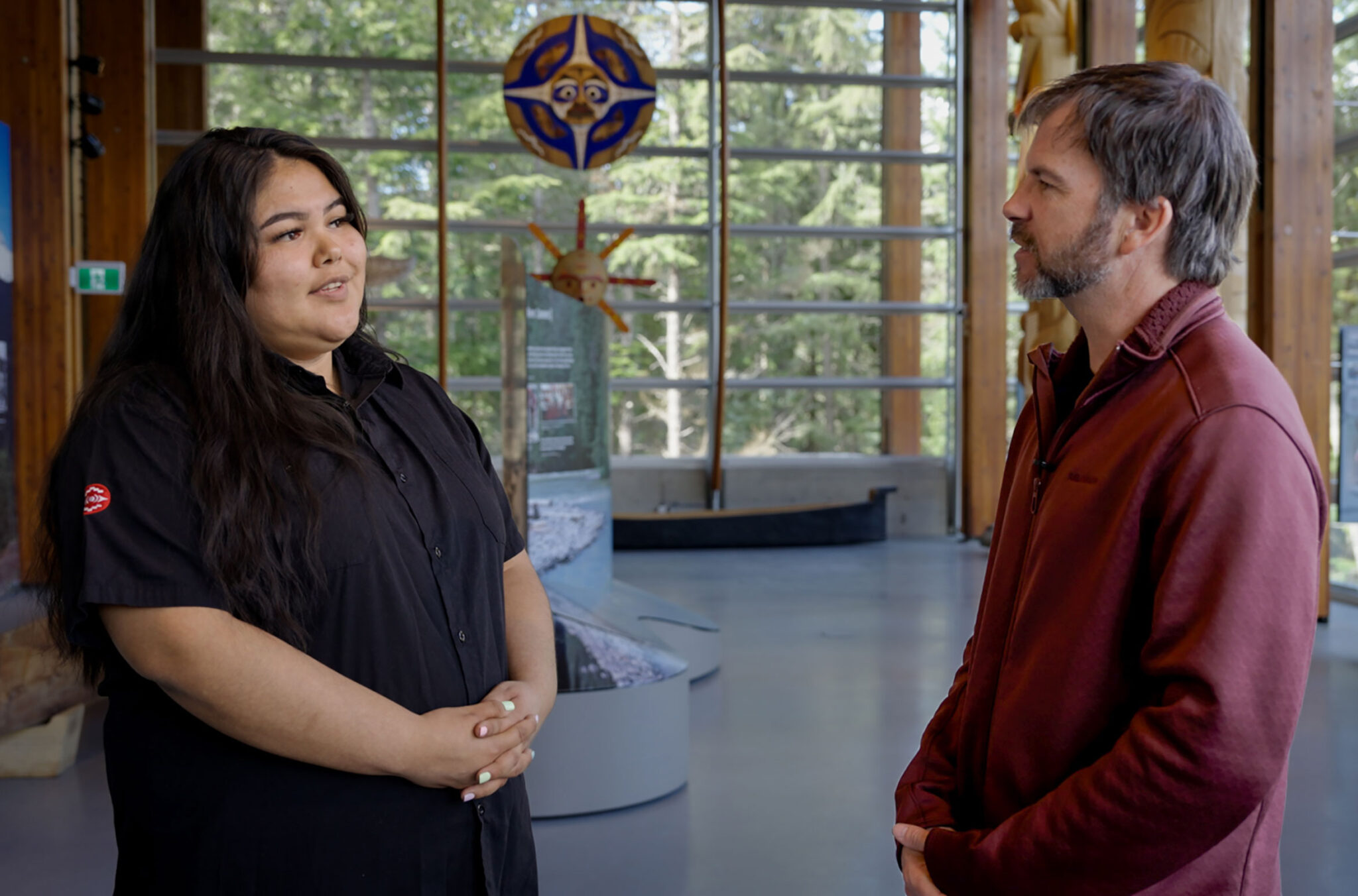In the Whistler Changemaker series, we’re connecting with local people, businesses and organizations who are putting sustainability at the forefront of what they do.
The Whistler community cares deeply for the environment and acknowledges that we all have a role to play in preserving the area’s natural beauty. The Municipality’s Big Moves Strategy sets out a plan to act on climate change and reduce emissions by 50% below 2007 levels by 2030, and in the long-term, reach net zero. To achieve this target, Whistler is collectively taking action to move beyond the car, reduce visitor travel emissions, decarbonize passenger and commercial vehicles, reduce building emissions, and shift towards lower carbon consumption.
We know that this kind of work is an ongoing journey as we all learn how we can contribute to a more sustainable future. Join our Changemaker host, Mike Douglas, a member-at-large of Protect Our Winters Canada, pro skier, enviro nerd and Whistler local as he shines a light on what’s happening in Whistler to move the dial.
In video #5, we touch base with T’ec Georgina Dan, Lil̓wat7úl, Cultural Leader of the Spo7ez Performance team and a graduate and co-facilitator of the Indigenous Youth Ambassador Program at the Squamish Lil’wat Cultural Centre (SLCC). She chatted with Mike about how important cultural sustainability is, what it involves, and how and why it can be a tool for reconciliation.
What does cultural revitalization involve?
Cultural revitalization involves preserving, amplifying and promoting traditional practices, languages, arts and values, particularly those that have been marginalized or lost. At the Squamish Lil’wat Cultural Centre (SLCC), this process is brought to life through various programs and initiatives.
These efforts aim to revive and sustain the rich cultural heritage of the Squamish and Lil’wat Nations, ensuring that their traditions thrive in contemporary society. By offering educational programs, workshops and exhibits, the Centre plays a crucial role in keeping these cultural elements vibrant and relevant for future generations.
Why is this so important?
Cultural revitalization is vital because it strengthens a sense of identity, pride and continuity within communities. For the Squamish and Lil’wat Nations, preserving and promoting their cultural heritage helps to strengthen community bonds, pass down knowledge to future generations, and correct historical injustices. It also enriches the broader society by showcasing diverse perspectives and traditions. Through cultural revitalization, we honour and respect the contributions of Indigenous peoples, ensuring their voices and histories are not only remembered but celebrated.
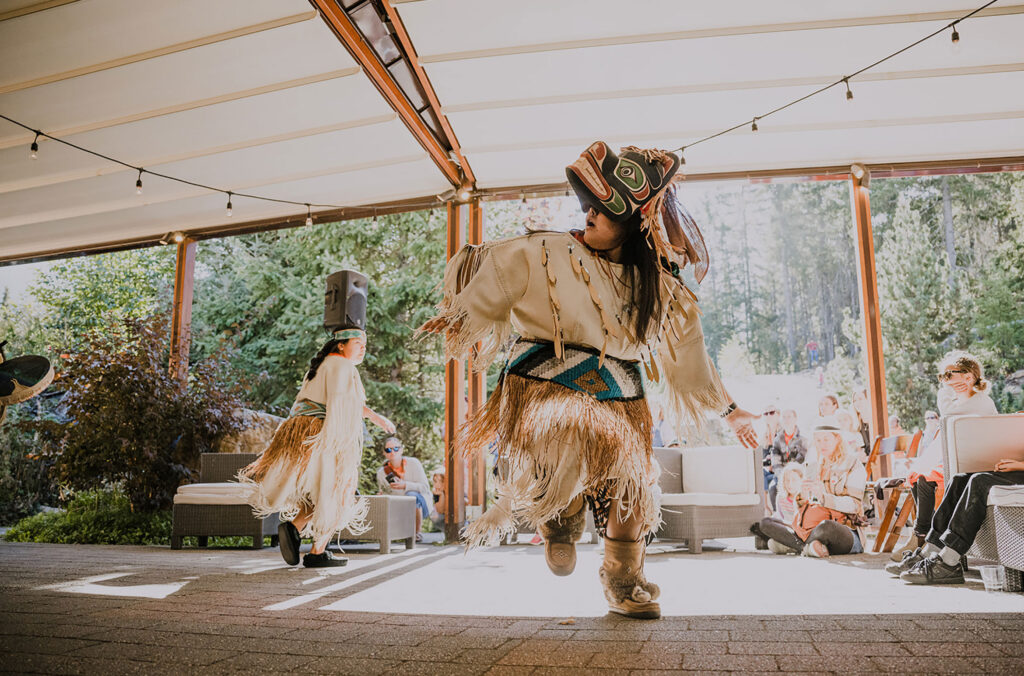
How do you foster that sense of identity and connection at the SLCC?
At the SLCC, we foster a sense of identity and connection by immersing visitors and community members in the rich cultural heritage of the Squamish and Lil’wat Nations. This is achieved through interactive exhibits, educational workshops and guided tours that highlight traditional practices, stories and art. Our programs involve sharing personal experiences and teachings, allowing people to engage directly with cultural knowledge. For Nation members living in the Whistler community, this creates a strong sense of belonging and pride, reinforcing their cultural identity amidst a broader societal context.
We also create opportunities for dialogue through community events such as National Indigenous Peoples Day and National Day of Truth and Reconciliation with discussion panels, and cultural exchanges, where Nation members and visitors can engage in meaningful conversations. These dialogues promote mutual understanding, respect, and appreciation of diverse perspectives, helping to bridge cultural gaps and build stronger relationships within the community. By celebrating and sharing our heritage, we strengthen the bonds within our community and inspire a sense of pride and belonging.
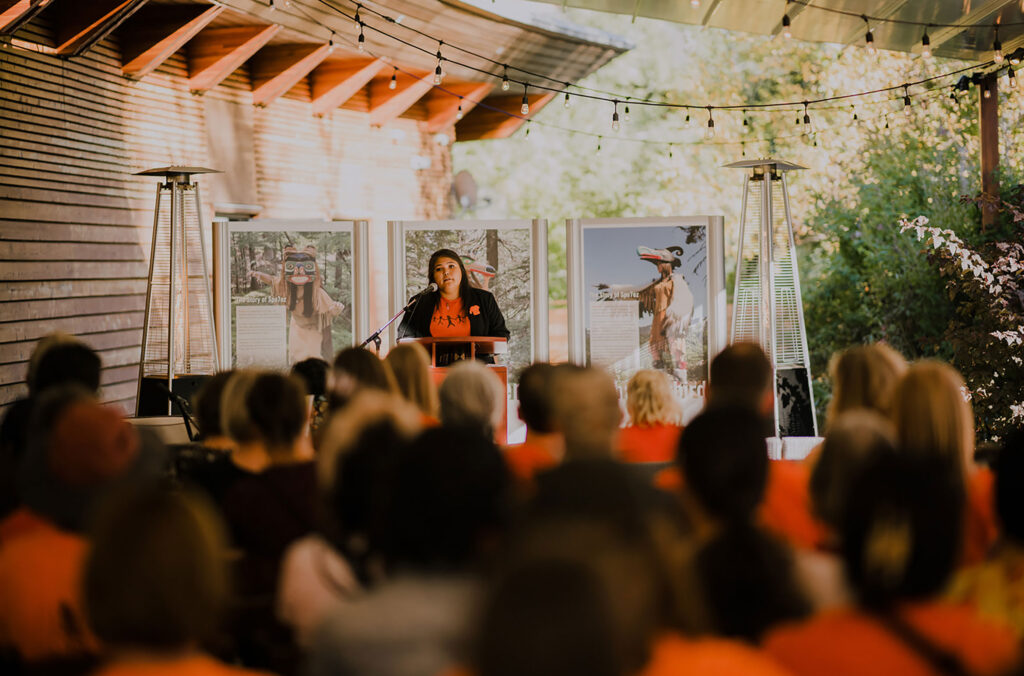
How are the carving programs part of cultural revitalization?
Carving programs are a vital part of cultural revitalization at the SLCC because they embody the traditional mentorship model. In these programs, experienced master carvers, like Xwalacktun, pass on their knowledge to apprentices through hands-on learning, observation and guidance. This process nurtures a deep sense of respect and trust between the mentor and apprentice, mirroring the traditional ways knowledge and skills have been transmitted through generations.
These carving programs not only teach technical skills but also immerse participants in cultural practices, stories, and values, ensuring that these traditions remain vibrant and relevant. This approach extends beyond the carving itself, influencing our Indigenous Youth Ambassador Program, where seasoned employees mentor new staff in various roles, including guided tours, gift shop operations, and café management. Through comprehensive training, mentors impart technical skills and share insights on customer interactions, communication, problem-solving, and the cultural nuances essential for exceptional service.
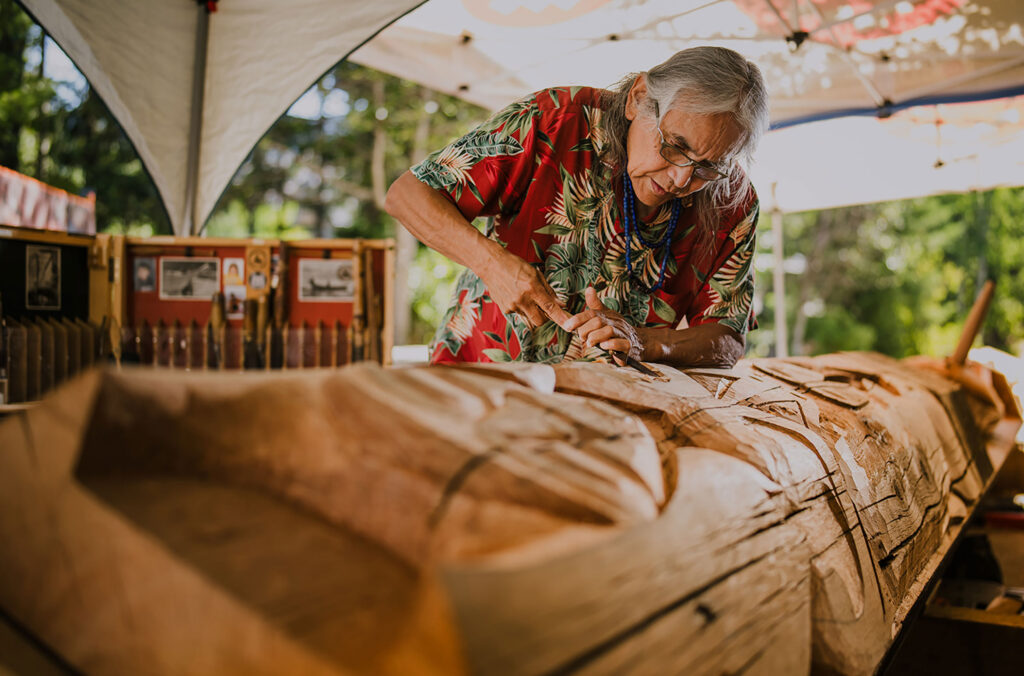
This mentorship fosters a strong sense of belonging, pride, and dedication among staff, creating a cohesive team committed to upholding the Centre’s standards and vision. Since its inception, over 600 youth have participated in the Indigenous Youth Ambassador Program, with many frontline staff and their families being former participants. These carving programs and the broader mentorship approach play a crucial role in preserving and revitalizing the cultural heritage of the Squamish and Lil’wat Nations.
Lil’wat Master Carver Ed NoiseCat mentored SLCC Apprentice and Cultural Ambassador Redmond Q̓áwam̓ Andrews in 2020-2022, and Lil’wat Master Carver Jonathan Joe will mentor Redmond as they carve a 30ft story pole this summer for the Salish Summer Carving Series.
What about language and naming?
Languages hold a profound significance for both the Sk̲wx̲wú7mesh and L̓il̓wat7úl Nations, as they are not only a means of communication but also a storehouse of cultural knowledge and identity. As caretakers of the land, our histories are deeply intertwined with the rivers, lakes, and mountains that shape our territories. Our ancestral connections to these landscapes are reflected in the place names we use, each name carrying layers of meaning and stories passed down through generations.
In recent years, there has been a positive shift towards reclaiming and revitalizing the original names of mountains and valleys within our territories. This resurgence signifies a meaningful step towards reclaiming our cultural heritage and asserting our Indigenous identities in contemporary society. By reintroducing these traditional place names, we honour our ancestors and affirm our stewardship of the land. It also creates a deeper connection to the landscape, allowing us to preserve and share our rich cultural narratives with future generations.
This revitalization of language is not just about words; it is about resilience, cultural pride and the ongoing commitment to preserve our languages as living, dynamic parts of our communities. It signifies a broader movement towards reconciliation and recognition of Indigenous knowledge and perspectives in the broader community, contributing to a more inclusive and respectful society where Indigenous languages and cultures are valued and celebrated.
View this post on Instagram
What else can be done to help with cultural sustainability?
To further support cultural sustainability, it’s essential to uplift Indigenous peoples within the workforce by creating inclusive spaces that value their perspectives and contributions. This involves actively hiring Indigenous individuals and providing opportunities for career growth and leadership development. Cultural training and education for all staff members can enhance understanding and respect for Indigenous cultures, led by Indigenous educators and community members.
Supporting Indigenous businesses and initiatives strengthens economic sustainability, fostering independence and resilience within Indigenous communities. Celebrating and preserving cultural practices through participation in cultural events and initiatives helps maintain and promote Indigenous heritage. Advocating for policies that protect Indigenous rights and support cultural preservation is also crucial. By taking these steps, organizations can foster a workplace where Indigenous employees thrive economically while preserving and celebrating their rich cultural identities.
What does the Squamish Lil’wat Cultural Centre represent?
The SLCC holds a unique significance for its ambassadors, some of whom travel two to four hours from Squamish Nation and Lil’wat Nation to be there. For them, the Centre represents more than just a workplace—it’s a platform to share their culture and address ongoing inequalities. By showcasing their traditions, languages, and arts, these ambassadors contribute to a broader effort of cultural revitalization and community upliftment. Their commitment reflects a deep understanding of the role cultural preservation plays in promoting resilience and pride within Indigenous communities.
At the SLCC, we see firsthand how cultural sustainability intersects with economic empowerment. Our Indigenous Youth Ambassador Program not only trains youth in cultural practices but also equips them with skills for career development and leadership. This dual focus on cultural heritage and professional growth empowers ambassadors to navigate the workforce while preserving and celebrating their heritage.
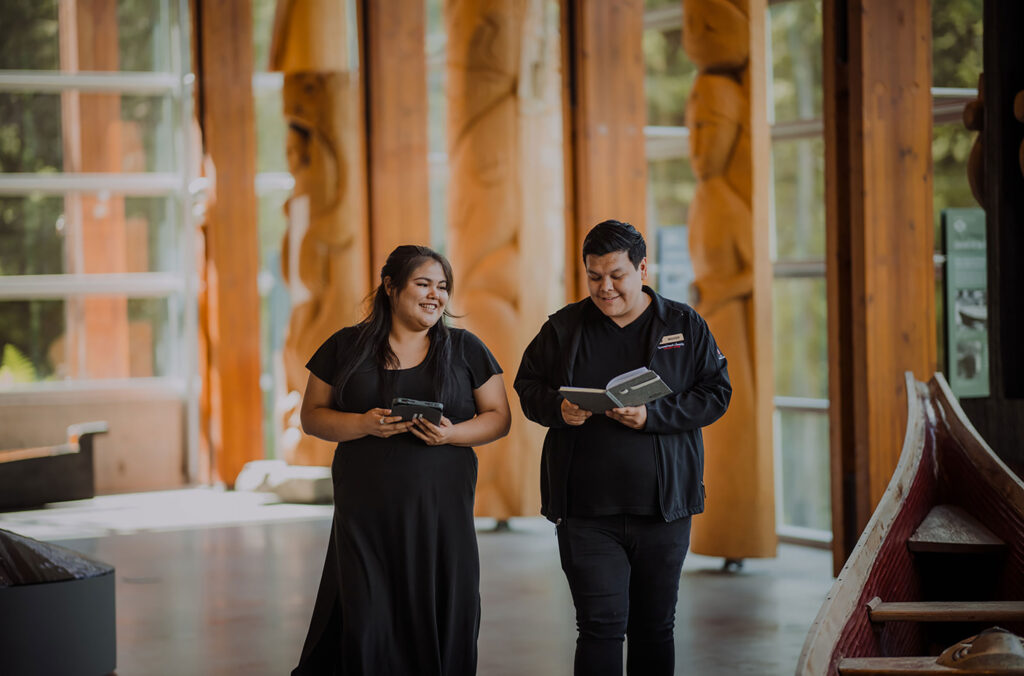
Moreover, cultural sustainability at the SLCC extends beyond daily operations. We actively engage in cultural education initiatives, ensuring that all staff members and visitors gain a deeper appreciation for Squamish and Lil’wat cultures. This educational outreach reinforces our commitment to fostering inclusive spaces where Indigenous voices are heard and valued.
By supporting initiatives that promote cultural sustainability, such as our ambassador program and educational efforts, the SLCC serves as a catalyst for positive change. It’s a place where cultural pride thrives, inequalities are addressed, and communities are uplifted through the enduring strength of Indigenous traditions.
What’s the biggest thing we can do?
The SLCC believes that one of the most impactful actions we can take is to recognize and honour the original people of the land and their deep connection to it. By acknowledging the traditional territories of the Squamish and Lil’wat Nations and their historical stewardship of these lands, we can foster a greater sense of respect and understanding among all visitors. This recognition serves as a foundational step towards reconciliation and healing, acknowledging past injustices while celebrating the enduring resilience and cultural richness of Indigenous communities.

Joining us at the SLCC means more than just visiting a cultural centre—it’s an invitation to connect with us on a deeper level. Our ambassadors, who travel from Squamish Nation (SN) and Lil’wat Nation (LN), are passionate about sharing their stories, traditions, and artistry. They embody a commitment to preserving and revitalizing their cultures, believing that by sharing their heritage, they contribute to broader societal change and upliftment of Indigenous communities.
Through engaging with our programs, exhibits, and educational initiatives, visitors not only learn about Squamish and Lil’wat cultures but also become active participants in the journey towards cultural sustainability. By supporting Indigenous-led initiatives and amplifying Indigenous voices, individuals and organizations alike play a crucial role in promoting equity and justice. Together, we can build bridges of understanding and respect, ensuring that Indigenous perspectives and histories are acknowledged and celebrated for generations to come.
The SLCC video is the fifth in the Whistler Changemaker series, to view more visit our sustainability page.
Spring savings are calling! There’s so much to see and do in spring, you’ll want plenty of time for fun in the sun. Extend your stay and book midweek for increased savings, with 3 nights starting from $135 CAD per night.
For summer, book ahead and save up to 25% on lodging. Plus, you'll receive a free $100 CAD Activity Voucher on stays of 3 or more nights ($200 for 5 nights).
Insider Tip: BC or Washington resident? Sign up for Whistler Rewards to access additional savings and exclusive perks.
